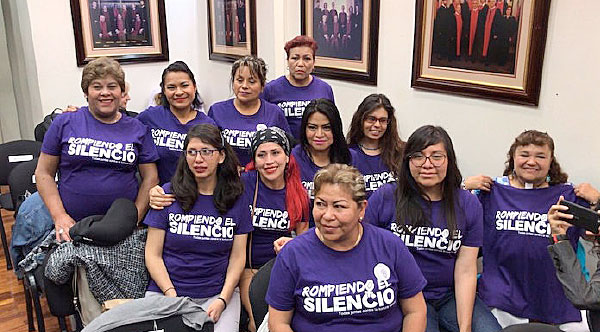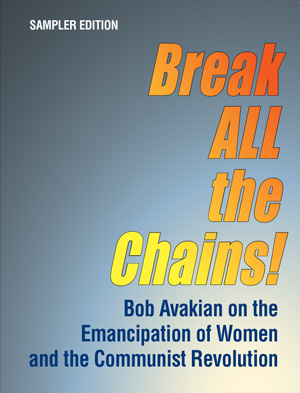“Now it’s the government’s turn to sit in the dock; all we want is justice”
Women of Atenco take Mexico to international court for sexual torture
November 20, 2017 | Revolution Newspaper | revcom.us
From a reader:
Eleven years after the bloody, vengeful police suppression of a just resistance in the village of Atenco, close to Mexico City, 11 of the dozens of women who were sexually tortured and brutalized by police took their case to the Inter-American Court of Human Rights. On November 16 and 17, before the court, which is based in Costa Rica, five women relayed their harrowing stories, which they have had to relate and relive over and over and over again each time the Mexican authorities have “investigated”—which amounted to attempts to humiliate them and extract an extra measure of punishment for daring to speak out.

In the court. Photo: Centro Prodh
Eleven years later, not a single policeman or prison doctor has ever been punished, and not one of the higher-ups in charge of the assault has even been accused. The women are asking the international court to demand that the Mexican government investigate the chain of command that led to the savage attack and the cover-up of the sexual torture. The governor of the state of Mexico at the time, who ordered the attack, was Enrique Peña Nieto, now the president of Mexico.
“Repeatedly, repeatedly, they made us feel small, invalid, broken, without value,” said one of the victims about the authorities’ humiliating and blameful “investigations.” On top of that, many suffered rejection from husbands and families, because of the cultural shame of rape, the lasting psychological trauma, and the time they had to devote to fight through on the case.
On November 17, these 11 brave women all appeared in court in T-shirts that read “Rompiendo el Silencio” (Breaking the Silence). As they have declared many times, sexual torture is systemic as a deliberate means to force women to stay out of political life; they are paying the heavy cost of breaking the silence not mainly for themselves so much as for untold thousands of women in Mexico—and they have specifically called out the rape of indigenous women which goes unpunished.
The Example of Atenco: Why police attacked
Includes "The New Synthesis and the Woman Question: The Emancipation of Women and the Communist Revolution—Further Leaps and Radical Ruptures," Part III of Unresolved Contradictions, Driving Forces for Revolution (2009). (p 18)
Read/Download PDF HERE.
The small rural town of San Salvador Atenco (“Atenco”) in the state of Mexico, 20 miles from the capital, Mexico City, had made headlines around the world in 2002 when militant peasant farmers and their supporters successfully blocked national plans to expropriate their lands for an airport. For the Mexican ruling class, Atenco was one resounding defeat in an overall battle to impose a neoliberal development model which the U.S. imperialists have been forcefully promoting.
To give just a taste of what was swirling around the Atenco struggle and why the authorities hated it so, here is a note from a four-part report by a Revolution writing team which spent time camped out with hundreds of protestors in 2002 (Revolutionary Worker #1178, December 8, 2002):
Many women said that before they became active in the struggle they were mujeres agachadas—women with their heads bowed down. They followed the same routine every day: buy food, cook the food, wash the dishes, wash clothes, clean the house, cook again, wash again, etc., etc., etc. They rarely saw beyond their front door—not because they didn’t care, but because it “wasn’t their place.” All this changed when they learned about the government’s plans to expropriate their land. A flame was ignited in the hearts of the women of Atenco.... The women described this change as “el día que nací”—“the day I was born.”
Four years later, in May 2006, police attacked and evicted a group of street flower vendors in the nearby town of Texcoco. Instead of backing down, some 300 townspeople seized the plaza, blocked the highway, chased police out, and made a “citizens’ arrest” of some of the brutalizers. As in 2002, supporters flocked to the town to defend them and/or document the events. Mexican TV news repeatedly aired aerial views of police fleeing ignobly en masse from protestors, and of protestors beating police in punishment for their brutal assaults. To the Mexican government and its imperialist patrons in the U.S., it raised the ominous question of whether Mexico was becoming “ungovernable,” and this could not be allowed.

In response, the governor of the state of Mexico—at that time Enrique Peña Nieto, now the national president—sent 3,500 police to attack Texcoco and Atenco like an invading army. They tear-gassed the main square, shot two people to death (one of them a 14-year-old boy), ganged up to beat dozens of people to a bloody pulp, and threw them in piles onto trucks and buses. They singled out 47 women and threw them onto buses to be taken to a women’s prison two hours’ drive away.
That drive lasted more than four hours: an eternity of rape, sexual torture, and terror that forever haunts the lives of every woman on those buses. They were raped, beaten, penetrated with fingers and metal objects, forced to perform oral sex, robbed, humiliated, and threatened with death, all this while their shirts were pulled up over their eyes and, in many cases, they were literally stacked face down in piles of bloody bodies. They could hear the other women crying out in pain, begging for the abuse to stop, or saying that they couldn’t breathe beneath the pile.
As nightmarish as each testimony is, what stands out is the calculated nature of the assaults and the targeting of women who dare to stand up.
Several police interviewed anonymously, wearing hoods, reported that it was their commanders who ordered them to attack “anything that moved” in Atenco (as shown in the documentary Atenco Romper el Cerco (Breaking the Encirclement)). Also in the documentary, an observer reported that when the police were throwing the women prisoners onto the bus, they shouted, “Now you bitches are going to find out what it really means to be in a revolt.” At the same time that they were beating and raping them, they said that it was all the women’s own fault, that if they had stayed at home making tortillas, none of this would have happened.
When the women arrived at the prison, days passed before they received medical attention, and when they did, prison doctors ignored clear evidence of sexual abuse and beatings. One woman, whose fingers were so badly broken and permanently damaged that she had to give up her artistic career, testified that a doctor told her that the women had surely wounded themselves in order to complain. Instead, the authorities charged the women with crimes such as “blocking public access,” and several of them served time on serious trumped-up charges, one woman two years.
“The manuals of radical groups say that they should claim they were raped”
―President of Mexico

Look at all these beautiful children who are female in the world. And in addition to all the other outrages which I have referred to, in terms of children throughout the slums and shantytowns of the Third World, in addition to all the horrors that will be heaped on them—the actual living in garbage and human waste in the hundreds of millions as their fate, laid out before them, yes, even before they are born—there is, on top of this, for those children who are born female, the horror of everything that this will bring simply because they are female in a world of male domination. And this is true not only in the Third World. In “modern” countries like the U.S. as well, the statistics barely capture it: the millions who will be raped; the millions more who will be routinely demeaned, deceived, degraded, and all too often brutalized by those who are supposed to be their most intimate lovers; the way in which so many women will be shamed, hounded and harassed if they seek to exercise reproductive rights through abortion, or even birth control; the many who will be forced into prostitution and pornography; and all those who—if they do not have that particular fate, and even if they achieve some success in this “new world” where supposedly there are no barriers for women—will be surrounded on every side, and insulted at every moment, by a society and a culture which degrades women, on the streets, in the schools and workplaces, in the home, on a daily basis and in countless ways.
Bob Avakian, BAsics 1:10
Back in 2006, Enrique Peña Nieto’s response to the reports of the sexual torture was: It is “known that the manuals of radical groups say that they should claim they were raped, if they are women, or if they are men, that they were victims of abuse and beatings. We should not fall into the fabrication of guilt based on these accusations.” (Interview with a local newspaper reported in La Jornada, June 16, 2006)
What the fuck?! Why has nobody ever asked him to produce said “manual”? Being dumb does not give you a pass to be a lying sack of shit, Peña.
However, in the metaphorical manual of the oppressors, rape as a means of terror is one of the oldest pages in the book, and it reflects the great importance, for any oppressive system, of keeping women in their place and using patriarchy in the general population to maintain the social order.
As the years dragged by and the Mexican government had only remanded for investigation some lower level policemen, not one of whom it has managed to convict, the Centro Prodh [El Centro de Derechos Humanos Miguel Agustín Pro Juárez], which has spearheaded the case, and CEJIL (Center for Justice and International Law), decided that their only recourse was to take the case to the international court. Last fall, the Inter-American Commission on Human Rights (which, together with the court, are entities of the Organization of American States) determined that there was sufficient evidence for the court to hear the case against Mexico. The court is expected to issue a ruling early next year.
In the past couple of years, the Mexican government, faced with the potential embarrassment on the world stage of an international court hearing the Atenco case on top of the ongoing struggle around the forced disappearance of the 43 Ayotzinapa students, has remanded more policemen and prison doctors, so that they could beat their chests in the court hearings on November 16-17 about how all of 52 public servants had been remanded in the case, and that the Inter-American Commission had “committed a grave error” in its ruling to hear the case and hence is unfairly affecting those ongoing cases as well as the government’s “judicial security.” It also complained that the court had failed to take into consideration that the government had offered the 11 women “reparations” such as scholarships and psychiatric treatment, which, it whined, they refused to accept. It also claimed to have made advances in “gender equality” in government. At the same time, under pressure, it accepted responsibility for human rights violations committed, including sexual torture.
But... why is it still the case that the only people who have spent time in jail in this case ARE THE VICTIMS? Why is Enrique Peña Nieto not sitting in the dock right now? Where are the other three top state and federal officials who were right on hand in the middle of the action? Where is the head of police? And who gave the order to “attack anything that moved”? The farthest up the chain of command that the authorities have gone is one police commander in charge of one bus—and he was never even indicted, for “lack of evidence.” Also, the women are demanding justice for all the victims of the police violence in Atenco and Texcoco, including about 170 men who were savagely beaten, and two who were murdered.
As far as Mexico’s supposed “advances in gender equality,” Amnesty International filed an amicus curiae brief with the court in which it noted, “the sexual violence which was used in the case continues to be habitual during the arrest of women,” and “we observe that sexual torture continues to be a common practice in our country which remains unpunished.”
In a historic moment in time when, on a global scale, sexual abuse by powerful men is being dragged into the light of day, the brave Women of Atenco who have held firm to their truth against great odds and difficulties for 11 years deserve to have their story spread on a global scale, “not only so that justice is served but also so that these acts are not repeated,” said one of the 11 accusers. Another said, “Today it’s the government’s turn to sit in the dock; all we want is justice.”
Volunteers Needed... for revcom.us and Revolution
If you like this article, subscribe, donate to and sustain Revolution newspaper.


